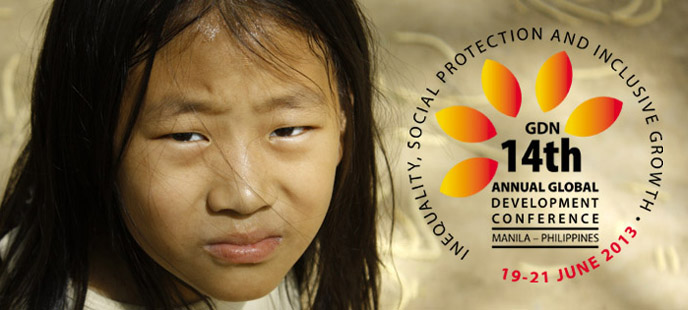
 It is my great pleasure to introduce you to the GDN 14th Annual Global Development Conference on 'Inequality, Social Protection and Inclusive Growth' jointly organized on 19-21 June in Manila, Philippines, with the Asian Development Bank (ADB), East Asian Development Network (EADN) and Philippine Institute for Development Studies (PIDS). Why bring more than 400 participants from all over the world to yet another international conference on a theme that seems to have become a new fad in international debates? Is there anything new to consider after hours of litanies and pages of inspiring publications on "pro-poor" growth, "shared" growth, "sustainable" growth or other code words through a newish concept of "inclusive growth"? These concepts are all admittedly different, yet, they all leave us with our incapacity to successfully combine a focus on individual livelihoods with the consideration of appropriate aggregate indicators. Should we go on pondering whether growth and inequality reduction go hand in hand or not, whether one has to be considered prior to the other, or whether a policy focus on inequality reduction weakens or strengthens the growth objectives of a country?
It is my great pleasure to introduce you to the GDN 14th Annual Global Development Conference on 'Inequality, Social Protection and Inclusive Growth' jointly organized on 19-21 June in Manila, Philippines, with the Asian Development Bank (ADB), East Asian Development Network (EADN) and Philippine Institute for Development Studies (PIDS). Why bring more than 400 participants from all over the world to yet another international conference on a theme that seems to have become a new fad in international debates? Is there anything new to consider after hours of litanies and pages of inspiring publications on "pro-poor" growth, "shared" growth, "sustainable" growth or other code words through a newish concept of "inclusive growth"? These concepts are all admittedly different, yet, they all leave us with our incapacity to successfully combine a focus on individual livelihoods with the consideration of appropriate aggregate indicators. Should we go on pondering whether growth and inequality reduction go hand in hand or not, whether one has to be considered prior to the other, or whether a policy focus on inequality reduction weakens or strengthens the growth objectives of a country?
As always, there are two ways to look at these questions. One might first be tempted to discount recurring incantations that have little impact on actual policies and results in terms of inequality reduction and conclude that this is wasted time and resources at an era when growth concerns loom large all across the world and resource constraints call for demonstrable value-for-money. Or one might conversely consider, and this is GDN's claim, that the legitimate frustration with insufficient results does justify more research and more debate, possibly differently, about the issues, because this is where value-for-money lies as the best way to go on learning about these unmet challenges and to help change mindsets and policy incentives and priorities, however slowly.
In that very spirit, GDN's conference in Manila pursues a threefold objective. The first one is to move from endless and ineffective recommendations (e.g. "one should reduce income, gender, and other forms of inequalities") to evidence-based and operational discussions. While income inequality, as is well documented by ADB research, has increased in many countries in Asia and the Pacific, Latin American studies document that it has in fact decreased over the 2000s in 13 countries out of 17 in the region. It is crucially important to understand how local policies worked to produce these results and what can be learnt from these examples. This has been one of the objectives of GDN's ongoing research projects on "Varieties of Governance: Effective Public Service Delivery", and "Strengthening Institutions to Improve Public Expenditure Accountability". These projects provide unique insights on how local priorities may be effectively defined and transcribed in budgetary planning, and on how various forms of governance, from decentralization to users' participation and to privatization, can impact, differently in different contexts, on the quality and quantity of public service delivery.
Both the rise of poverty and inequalities in industrial countries, and their persistence in developing countries amidst a diversity of experiences, suggest that the empirical design of social protection schemes and of "inclusive growth" policies is still a mostly unchartered agenda. In a context in which policy priorities are largely the results of local political economy considerations rather than general discussions on what "should be" done, it is crucial to expose facts and document policy results, because this is what can powerfully change domestic agendas. This is what GDN's research experience confirms, for instance through the recently completed research program "Supporting Policy Research to Inform Agricultural Policy in Sub-Saharan Africa and South Asia". This is also what all participants in the GDN Conference in Manila will help do.
Second, insofar as inequality concerns loom large in developing countries, the agenda needs to be driven by them, and not by international experts or aid agencies, however well-intentioned and knowledgeable they might be. Ownership matters, first and foremost through the definition of the policy as well as the research agendas. The second purpose of this conference, therefore, is to raise the voice of developing country researchers, to listen to them, and somehow to complement the tradition of having them learn from and respond to seasoned international academics by giving them a chance to confront their views and their research more directly to comments, insights and advice from these academics. The idea is to bring the best experts to the developing countries' researchers' agendas and works, rather than the reverse. For instance, this year, the finalists of GDN's Global Development Awards and Medals Competition will be plenary session speakers during the conference.
Third and finally, GDN's overarching theme is research capacity building to inspire better policies. What we expect from this conference is a discussion on how best the research agenda can respond to policy challenges in various developing regions, including Asia, and to get insights on how best to build the necessary capacity. As we all know, the connection between social science research and policy is not an easy one. The time dimension, the sets of incentives, the methods, and the interplay of parochial interests all differ widely. Yet, both researchers and policymakers also share the paramount objective of improving livelihoods, so that there is ample room for more coordinated approaches, and for looking at how well-conceived scientific research can provide useful evidence and guidance for policymakers to consider. GDN will be keen to follow-up on the Conference results with a global research program inspired by the Manila discussions and to look for support to implement it.





